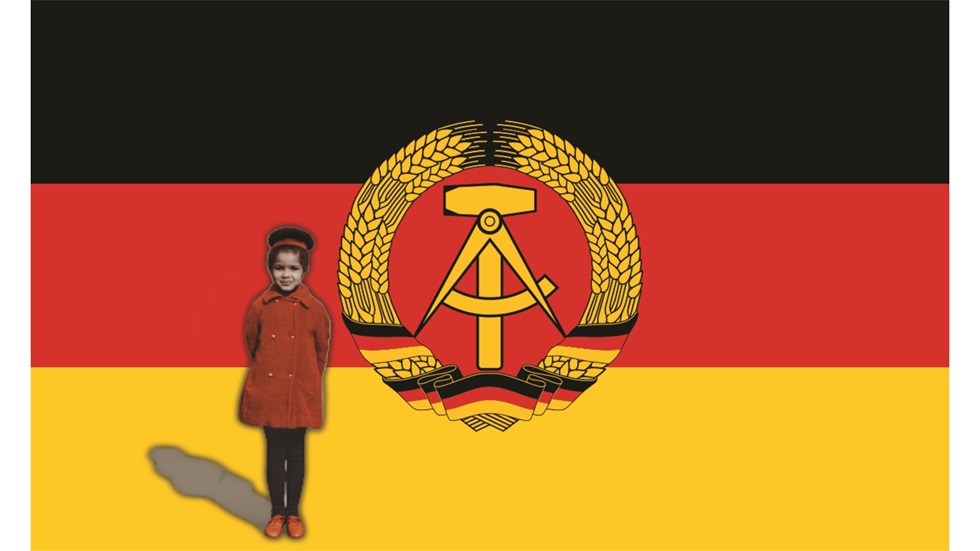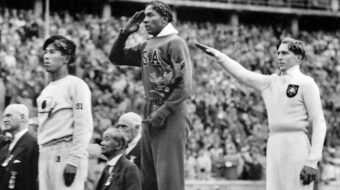
The 32nd Pan African Film & Arts Festival, America’s largest Black-themed filmfest, took place Feb. 7 – Feb. 19 in Los Angeles. During Black History Month, PAFF annually screens movies ranging from Hollywood studio productions to indies, foreign films, documentaries, low budget productions, shorts, etc. Films span the spectrum from Oscar nominees to hard-to-find gems from Africa, the Caribbean, America, and beyond that L.A. viewers are unlikely to be able to see at any other venue. People’s World culture correspondent Ed Rampell reviews just a few of the films audiences had an opportunity to see this year.
Becoming Black: From Berlin to Benin and Togo, growing up black in a “red” country
In one of the early Civil Rights movies, 1964’s fact-based Black Like Me, John Howard Griffin (the real-life Caucasian journalist is depicted by James Whitmore) dyes his skin color in order to pass as African American. Sixty years later this might be condemned for perpetrating and perpetuating “blackface,” but at the time, it was hailed as heroic because by posing as a Black man, the white author was able to gain ingress and expose the despicable apartheid conditions of the segregationist South.
Ines Johnson-Spain’s poignant documentary Becoming Black put me in mind of Black Like Me’s race-switching theme. Unlike Griffin, a white who tried to “change” his race, Ines was born in the early 1960s in the German Democratic Republic (aka the GDR and “East Germany”) to an Aryan mother and raised by her and her German husband as just another Germanic child in East Berlin—despite what is called onscreen her “black frizzy hair” and dark complexion.

Ines knew there was more to the unusual circumstances of her birth than some sort of rare genetic mutation or occurrence (as she was told) and stumbled upon part of the truth when she was about 12 or 13 years old. Her moving nonfiction film is about Ines’ unique personal odyssey to unlock and fully discover the truth as to why she was Black growing up in the Red, pro-Soviet portion of eastern Germany.
As Becoming Black unfolds, in order to prove the superiority of socialism, in the early 1960s the GDR invited Africans to study at German universities, which is how Ines’ mother encountered Lucien, perhaps at a Leipzig demonstration of these foreign exchange students protesting the murder of the Congolese leader Patrice Lumumba in January 1961.
There’s a lot that goes unsaid in this deeply personal documentary, but apparently Ines’ mom (who died in the 1980s) was married at the time Lucien impregnated her to Ines’ stepfather (they already had an older brother), who was doing his military service at the time and posted elsewhere in the GDR.
Beneath its socialist sheen, the GDR—which was only 16 or so years earlier ruled by the vehemently white supremacist, fanatical “Master Race” Nazis—still had lots of racism to overcome. Ines grew up with the sense of being a fish out of water, with lots of mysteries surrounding her origins, as beyond the GDR’s communist façade, she felt herself to be an outsider because she was dark-sinned. Perhaps it could be said that this was a sort of ethnic equivalent to sexual dysmorphia?
To make a long story short, Becoming Black focuses on Ines’ brave travels from East Germany to West Africa to meet and ultimately reunite with her extended family in Togo and Benin, two countries that border one another. Ines made her first journey of discovery there when she was 28, but like much else in this narrowly focused film, there’s no footage and few if any photos of that initial family foray, although it is described.
Most of this documentary zooms in on recent footage of Ines with her African brothers and sisters, aunties, uncles, et al, and her German stepfather who, to his credit, steps up to be candidly interviewed, as do Ines’ affable African siblings, etc.

How will Ines’ African family and father, Lucien—who remained in Germany all those years—receive and treat her? How will her stepfather grapple with what seems to be his young wife’s infidelity during the early years of their marriage? It’s all rather touching as Ines uncovers and reveals the truth in a deeply personal piece of investigative journalism directed by the subject, Ines herself, working with a small film crew.
As indicated, Becoming Black is a closeup on the issue of Ines, her racial identity, and ethnic origins, vis-à-vis her German and African kinfolk, but this single-minded film tells us little if anything else about the subject and filmmaker, who is one and the same here. There’s a 30-year gap, and we learn precious else about Ines and her life, info she could have briefed audiences about via voiceover and onscreen title.
One of the points just mentioned in passing at the start of the documentary has to do with how Ines came to be, so during a post-screening Q&A, I asked her a question regarding the Big Picture, that went from the micro to the macro, involving the Cold War geopolitics of the time.
As Ines explained, in the postwar era, “The GDR was rejected as an independent German country. [Therefore] they tried to make relationships with anti-colonial, likeminded nations. [So] Africans were invited to study [at government expense], to be brainwashed and return to their countries [presumably to spread socialism, or the GDR version of it]. But the GDR government did not want them to stay in Germany, to have families.”
Fraternizing with German residents was frowned upon; at one point, dogs were called in to patrol GDR universities, Ines said. Commenting on her mother’s relationship with Lucien, Ines remarked: “To be [a German woman] with a Black man in GDR was something, because of the racism.”
The Germans Karl Marx and Friedrich Engels may have written in The Communist Manifesto that “The workingman has no country,” but in the GDR version, this says nothing about “the workingwoman.” Thankfully, as Becoming Black indicates, Ines Johnson-Spain—who says “my identity is someone always searching”—has found herself and homeland, as she divides her life and time between Berlin, Benin, and Togo.
We hope you appreciated this article. At People’s World, we believe news and information should be free and accessible to all, but we need your help. Our journalism is free of corporate influence and paywalls because we are totally reader-supported. Only you, our readers and supporters, make this possible. If you enjoy reading People’s World and the stories we bring you, please support our work by donating or becoming a monthly sustainer today. Thank you!












Comments